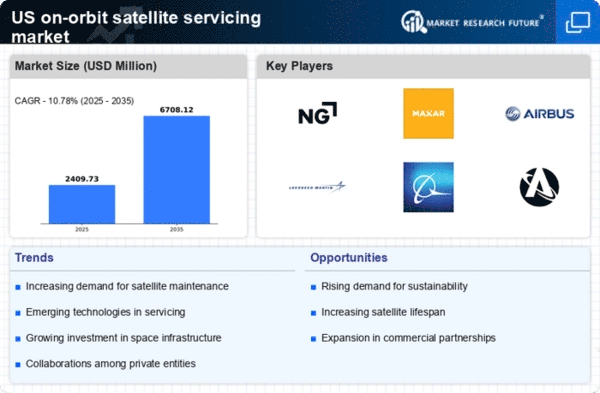Rising Commercial Space Activities
The on orbit-satellite-servicing market is significantly influenced by the surge in commercial space activities. With private companies increasingly entering the space sector, there is a growing need for satellite servicing solutions. The commercial space industry in the US has seen investments exceeding $20 billion in recent years, indicating a robust interest in satellite operations. This influx of capital is likely to drive innovation and competition within the on orbit-satellite-servicing market. Companies are now exploring various business models, including partnerships and collaborations, to leverage servicing capabilities. As commercial entities continue to expand their satellite constellations, the demand for servicing solutions is expected to rise, further propelling the growth of the on orbit-satellite-servicing market.
Advancements in Robotics and Automation
Technological innovations in robotics and automation are playing a pivotal role in shaping the on orbit-satellite-servicing market. The development of sophisticated robotic systems enables more efficient and precise servicing operations, which can significantly reduce the risks associated with human intervention in space. For instance, advancements in autonomous systems allow for real-time decision-making and execution of complex tasks, enhancing the overall effectiveness of servicing missions. The market is witnessing investments in these technologies, with projections suggesting that the robotics segment could account for over 30% of the total market share by 2030. As these technologies continue to evolve, they are likely to enhance the capabilities and appeal of the on orbit-satellite-servicing market.
Growing Focus on Space Debris Mitigation
The increasing concern over space debris is driving interest in the on orbit-satellite-servicing market. As the number of operational satellites rises, so does the risk of collisions and the creation of debris, which poses a threat to both existing and future missions. Regulatory bodies and space agencies are emphasizing the need for debris mitigation strategies, which include satellite servicing as a viable solution. The market is likely to benefit from initiatives aimed at removing or repurposing defunct satellites, thereby contributing to a safer space environment. This focus on sustainability and safety could lead to increased funding and support for servicing technologies, further enhancing the growth prospects of the on orbit-satellite-servicing market.
Increased Demand for Satellite Longevity
The on orbit-satellite-servicing market is experiencing heightened demand for extending the operational life of satellites. As satellite operators seek to maximize their investments, the ability to perform maintenance and upgrades in orbit becomes increasingly valuable. This trend is underscored by the fact that the average lifespan of satellites has been rising, with many now expected to operate for over 15 years. The servicing capabilities offered by this market can potentially reduce the need for costly replacements, thereby saving operators millions of dollars. Furthermore, the ability to enhance satellite functionality through servicing can lead to improved service offerings, which is crucial in a competitive landscape. As a result, the on orbit-satellite-servicing market is likely to see substantial growth driven by this demand for longevity and enhanced capabilities.
Strategic Partnerships and Collaborations
The on orbit-satellite-servicing market is witnessing a trend towards strategic partnerships and collaborations among key stakeholders. As the complexity of satellite servicing missions increases, companies are recognizing the need to pool resources and expertise. Collaborations between satellite manufacturers, service providers, and government agencies can lead to innovative solutions and shared risk. This trend is evident in recent agreements that have emerged, with several companies forming alliances to develop new servicing technologies. Such partnerships not only enhance the capabilities of the on orbit-satellite-servicing market but also facilitate access to funding and resources. As the market matures, these collaborations are likely to become a cornerstone of growth and innovation.

















